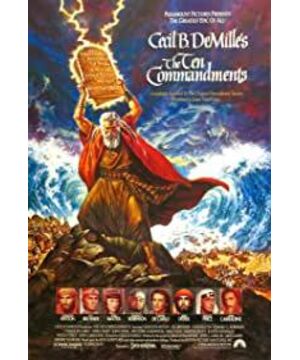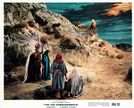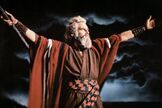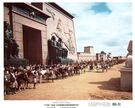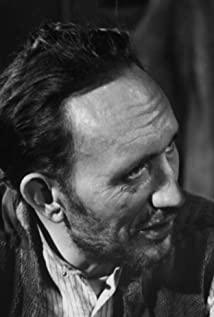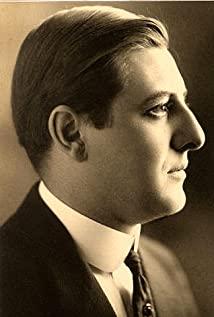The Ten Commandments I bought last year have been lying in the cabinet, and I finally watched it yesterday. Every time I watch a movie that lasts more than 150 minutes, I have to brew for a long time, because watching a movie requires concentration and coherent thinking. So if a film with a tight plot and ups and downs can be completed in one go, the most feared is the old, obscure, dull philosophical film, it will be very painful, and it is easy to fall asleep without talking. Once you don’t persist, you can watch it several times. , The understanding of the characters and connotation will be fragmented, so you must spend a whole piece of time watching a movie to appreciate it.
The story of the Ten Commandments is adapted from the "Exodus" in the Old Testament of the Bible. It tells the story of the Jewish prophet Moses leading the Jewish people out of Egypt. This story, which is well-known in the Western world, has been put on the screen several times, and the most famous one is directed by American director Cecil B. Demi. In fact, he has directed twice, the first time. The 136-minute silent black and white film was filmed in 1923. Although I have not watched it, I guess it should be the one with little snowflakes all over the eyes. Then 33 years later, the director shot another film of the same name. The difference is this Before this comparison, there have been leaps and bounds in character, plot, scale and technology. What I was watching was this 220-minute color version of the film, which was shot in 1956.
At the beginning of the movie, a middle-aged man walked out from behind the scenes. He made a preface to the movie like the announcer. It seems that he has seen such a serious prelude to the movie before. The preface was short, and soon the film officially entered the topic. It may be the reason why I bought a Blu-ray disc. Before I watched a few shots, I found that the clarity of the picture was beyond my imagination, and the color resolution was extremely high, especially when the Egyptian princess found a basket with Moses on the water. The picture is as bright as an oil painting. As the plot unfolded, I had a familiar hunch—just like the "Benxu", "Lawrence of Arabia", "Brave Heart", "Jan of Arc" and "Kings of Heaven" that I have seen before. "The Ten Commandments" is also a story about the growth of a personal hero, and it has universal basic elements unique to epic films. For example, the protagonist must be a personal hero. The background of the story generally takes place in the cold weapon era, and the hero always has A woman who values both wisdom and beauty loves him deeply. The hero always looks like a handsome young boy at the beginning. He is a good son of his mother and a good companion of lovers. With the development of the hero, his children will love him. The entanglement gradually receded, and he finally became a deified image who escaped the normal life of mortals and was admired and worshipped by all people.
The story begins with the Egyptian Pharaoh’s astrological revelation that the Egyptian dynasty will be overthrown by a Hebrew savior in the future, and ordered the strangulation of all Hebrew newborns. In order to keep her son, the young mother Jojobel put the new-born boy in a basket and let him float away with the water, everything goes well. Later, the basket was discovered by the Egyptian princess, and the baby boy was rescued and taken into the royal family, named Moses (Moses's swaddling is a piece of cloth commonly used by Hebrews, so Moses’ name is Hebrew, which means it comes along the water) The meaning of), many years later, the baby boy grew up, and under the care of the princess, he grew into a smart, fit, and talented prince, and he is also the most qualified successor to the next generation of Egyptian pharaoh throne. Pharaoh loved him, trusted him, and valued him even more than his own son, Ramsay, and appointed him to build a new city for himself. In the process of building the new city, Moses witnessed the tragic plight of the Hebrews under Egyptian rule. They were slaves for generations and had no freedom. They had to endure long-term hunger and endless hard labor, and their lives were as low as grass. Until death. At this time, he not only saved two Hebrew slaves, but also opened a granary and gave the Hebrew slaves a day of rest. Soon news reached the ears of Pharaoh. Under the instigation of Ramsay and others, Pharaoh visited the new city in person, and after witnessing Moses’ true abilities and achievements in building the city, he dispelled his doubts and ordered the name of Moses to be carved on each stone statue and On the stone tablet, as a table award. Pharaoh’s dependence on Moses deeply stimulated the nerves of the contenders for the throne. They tried every means to instigate and divorce the relationship between Pharaoh and Moses, until the princess’s maid, Manmei, told Nai about Moses’ Hebrew life. Fortyri (Moses' lover), she killed Manmei to ensure that Moses was on the throne, but Moses was also aware of it. After repeated questioning by Moses, Nefertiri finally told the truth, and Moses knew his true identity. Facing the truth, Moses made a choice-to return to his own people, lead them out of Egypt, regain freedom, and get rid of this unfair destiny forever. Immediately after the death of Pharaoh, Ramsay successfully enthroned. His attitude and policy towards the Hebrews became even harsher. In order to eradicate the perpetual troubles, he exiled Moses to the desert and gave him only one day's food and water. With amazing perseverance and physical strength, Moses successfully crossed the desert and came to Midian, where he met the daughter of the priest Yethro, Sipora, and married and had a son.
Looking at the "Ten Commandments" I think it should be divided into two parts. The first part is the transformation of Moses from an Egyptian prince to a Hebrew slave until Moses' life in Midian. It seems that he has entered a peaceful and secular state of life, but in fact I think this should be the hero’s brief period of confusion, depression, and trough. After a huge identity gap, he wanted to save his people, but he finally understood that the decline of his own power is difficult to contend with a country. The Hebrew nation The hope of rising has just been ignited and quickly collapsed, and the most fundamental driving force for the hero’s existence is the sense of salvation, mission, and responsibility. This blow shattered Moses’ confidence. The hero is also a human, with confusion and helplessness as well as vulnerability. With short-term paralysis, you will also lose your spiritual guidance and fall into the "ego" life. In despair, Joshua descended from the sky. This slave who had been saved by Moses turned into a messenger brought the ancient Hebrew faith to Moses and the revelation of God (here, Jehovah). Moses returned to Egypt under the inspiration of the Almighty God, thus completing his Nirvana from exile to Jewish prophet.
Through the guidance of the gods, Moses frequently gave instructions from the gods to Egypt-the scepter became a snake that swallowed Ramsey's rod, the holy water of the Nile became blood water, a vision appeared in the sky, and chaos for three days, owned by the Egyptians His eldest son was cursed with death... During this series of blows, the entire nation of Egypt was panicked, including the eldest son of Pharaoh Ramsay, and all the instructions of the gods became reality. Under pressure, Ramsay finally admitted the existence of the Hebrew God, willing to comply with God's will and give freedom to the Hebrews. In this way, the Hebrews finally ended their 400-year-long fate of slavery, and followed in the footsteps of Moses on the journey to the land known as "the land of milk and honey"-Canaan (an ancient name for Palestine, in Today the Jordan River and the West Bank of the Dead Sea) along the way to freedom.
I thought that when the movie is played here, the Hebrews will be happy when they have gained freedom, but a huge question arises-what are the Ten Commandments? The story has to go on to say that the Hebrews sang and danced to overturn When the old world ushered in a new life, but Moses did not come down on Mount Sinai. He received the commandment of God on the mountain—the
first commandment—you must have no other gods besides me;
second Commandment-Don't carve idols for yourself, or make images like the things in the sky, the earth, and the things under the earth and water; The
third commandment-Don't take the name of the Lord your God in vain;
The fourth commandment - Remember the Sabbath day, to keep it holy;
Fifth Commandment - Honor your mother, that your days may the Lord - thy God giveth thee to be long;
the sixth commandment - Thou shalt not kill;
first The seven commandments-do not commit adultery; the
eighth commandment-do not steal; the
ninth commandment-do not give false witnesses to frame others; the
tenth command -do not covet your lover's house, do not covet your lover's wife, maidservant, bull or donkey, And everything he has.
After receiving the Ten Commandments, Moses brought back the commandments of the gods engraved on the stone slabs to the clan, but found that the people of the clan had forgotten the suffering and humiliation, forgotten gratitude and self-discipline, forgot the gods, and forgot himself, and fell. Sinking, unwilling to save oneself. People are greedy for wine, laziness, and their lives are in a rotten state. They let their desires dominate, and even throw all their gold ornaments into the furnace to make a new artifact-the golden calf. Moses was completely resentful, and he lifted up the precepts of God and threw it at the golden calf. This shock awakened the people who were in lust and indulgence. They felt ashamed and ashamed. They clung to Moses again and begged God for forgiveness.
…………
After watching the movie for more than three hours, I don't want to say much about the technology, just a "like" word. After all, in an era when film production technology was so immature half a century ago, it is a legend in itself to be able to produce films of this level. For epic films, the first technical requirement is the magnificence of the scene. The so-called “scene” is not necessarily a crowded strategy. What is more important is that we can see the macro, far-reaching, heroic and magnificent in the language of the entire lens. This requires The interaction between human and natural background. In the video of "The Ten Commandments", when Moses supervised the construction of the new city, there were some big scenes. The khaki-colored Egypt completely reproduced the impression of this ancient country in my heart. The giant stone statues, sphinxes, stone pillars, The stele formed a strong contrast with the individual people, which may also be a metaphor for the prosperous Egyptian kingship and the small group of Hebrew slaves. Oppression and inequality are everywhere. Another more impressive image is the scene of Moses splitting the sea at the end of the movie. It is now compared to "The Day After Acquired", "Troy", "Pirates of the Caribbean" and other films, but I believe it should have made the director embarrassed at the time. Broken, in fact, it still seems quite shocking now. The other colors are also used just right. The clear blue waves, lush green vegetation, and golden costumes add to the visual beauty, especially the use of gold seems to be used for reference in the later "Cleopatra".
religion:
Speaking of religion, I think there is no religion that can stand up to Christianity in the Western world, and naturally no god can compare with Jesus. The extent of the influence of Christianity on the thinking, thinking, life and lifestyle of Westerners is probably unimaginable for us Gentiles with black hair and yellow skin. People not only believe in the existence of God, but also firmly believe that everything is under the control of God. The power of God is omnipresent. Therefore, stories about Christianity are everywhere, and his influence even interferes in politics (the Crusades) and literature (Christian literature). "The Ten Commandments" is a religious film as well as a film about the growth of a personal hero. The story is based on the Bible. Christian literature was born out of Greek and Roman literature, while Greek and Roman literature was formed in the early years of human civilization. The scientific system of human civilization has not been established, and the cognitive model is chaotic. Therefore, people think that humans and gods can be mixed. Most of the characters are half-human and half-god, and have supernatural powers. The hero Moses who walked out of this kind of origin will inevitably be attached. A layer of God's domain color. So the scepter becomes a snake, the blood of the Nile, the people who cross the sea and the descending of the gods, which seem to be unreliable in modern times, have been well explained in the movie.
Enlightenment:
Moses is the savior endowed with divine power in the film, and the messenger sent by Jehovah to save the Hebrews. In his experience, we grew up and witnessed his choices and efforts until we became the true messengers of God. Moses, who returned to Egypt, already had the mark of God at this time. He was a foreign warrior who took the responsibility of shouldering the common people's life. So when he came down from Mount Sinai, he saw the triumphant state of the tribe who had been freed, and was full of emptiness and fall. He was indignant, and completely exposed the ugly nature of human beings-seeking advantages and avoiding disadvantages, liking to work, arrogant and arrogant, lustful, lacking the ability of self-discipline, self-demand, and self-consciousness. Moses was sad, because saving the Hebrews and regaining their freedom was only the first step of the mission. Part of the Hebrews’ future and hope lies in drawing lessons from past disasters and experiences. Only in this way can they truly control their own destiny. , Not to be born like duckweed, dominated by anyone at will, but from these pleasure-seeking people, Moses did not see a trace of self-salvation. So I suddenly remembered a sentence called "One can't feed too much", maybe it's the same reason! Although Moses was born in Hebrew blood, he separated from the ethnic group and ascended to the spiritual leader of the Hebrews. This was determined by the realm of self-worth pursuit. Therefore, the "Ten Commandments" should not only point to the Hebrews, but use the cost of more than 400 years of enslavement of the Hebrews to call back those wandering souls-that people must pursue and self-discipline. In order to realize the true value of life. I think this is the philosophical thinking and profound meaning that the movie "Ten Commandments" wants to tell us!
View more about The Ten Commandments reviews


